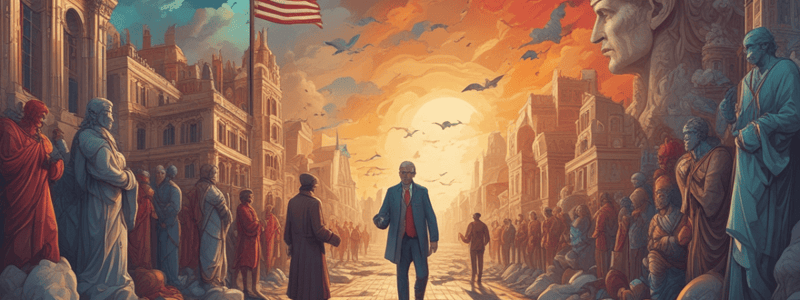Podcast
Questions and Answers
Match the following scholars with their contributions to comparative politics:
Match the following scholars with their contributions to comparative politics:
Roberto Michels = Iron Law of Oligarchy Maurice Duverger = Duverger's Laws Walter Lippmann = Critique of newspapers' role in shaping public opinion
Match the following theoretical approaches in comparative politics with their core assumptions:
Match the following theoretical approaches in comparative politics with their core assumptions:
Institutionalism = Institutions shape political outcomes Rational Choice = Individuals act rationally to maximize utility Constructivism = Ideas and norms shape political outcomes Historical Institutionalism = Institutions evolve over time and shape political outcomes
Match the following concepts in comparative politics with their descriptions:
Match the following concepts in comparative politics with their descriptions:
Oligarchy = Rule by a small group of people Multipartism = Presence of multiple political parties Two-party system = Dominance of two major political parties Public Opinion = Aggregate of individual opinions on a particular issue
Match the following scholars with their areas of focus in comparative politics:
Match the following scholars with their areas of focus in comparative politics:
Match the following theoretical approaches in comparative politics with their methodological assumptions:
Match the following theoretical approaches in comparative politics with their methodological assumptions:
Match the following concepts in comparative politics with their consequences:
Match the following concepts in comparative politics with their consequences:
Match the following scholars with their respective areas of focus:
Match the following scholars with their respective areas of focus:
Match the following terms with their definitions:
Match the following terms with their definitions:
Match the following approaches with their descriptions:
Match the following approaches with their descriptions:
Match the following scholars with their associated approaches:
Match the following scholars with their associated approaches:
Match the theoretical approaches of comparative politics with their primary focus:
Match the theoretical approaches of comparative politics with their primary focus:
Match the following goals with their corresponding areas of study:
Match the following goals with their corresponding areas of study:
Match the following terms with their definitions in the context of Comparative Politics:
Match the following terms with their definitions in the context of Comparative Politics:
Match the theoretical approaches of comparative politics with their primary focus:
Match the theoretical approaches of comparative politics with their primary focus:
Match the theoretical approaches of comparative politics with their primary focus:
Match the theoretical approaches of comparative politics with their primary focus:
Match the theoretical approaches of comparative politics with their primary focus:
Match the theoretical approaches of comparative politics with their primary focus:
Match the theoretical approaches of comparative politics with their primary focus:
Match the theoretical approaches of comparative politics with their primary focus:
Match the theoretical approaches of comparative politics with their primary focus:
Match the theoretical approaches of comparative politics with their primary focus:
Flashcards are hidden until you start studying




